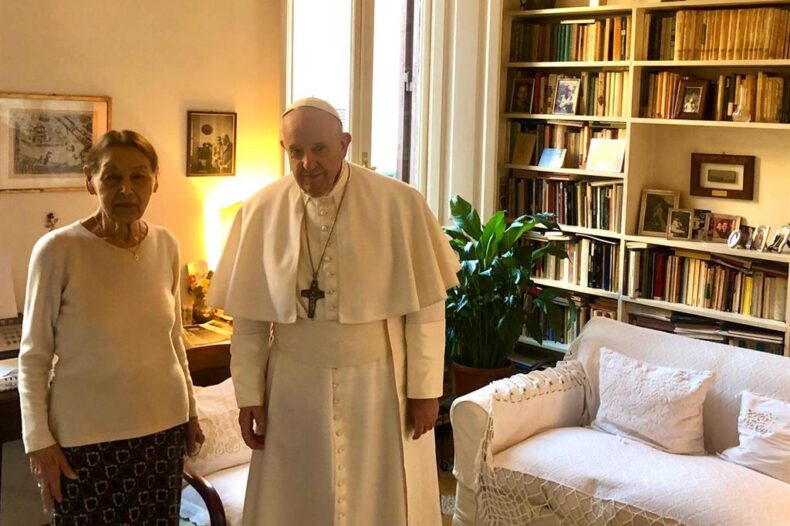“Memory is living, writing is breathing” Pope meets with Holocaust survivor Edith Bruck

“Remembering is a pain, but I never shirked. Even illuminating a single consciousness is worth the effort and the pain of keeping alive the memory of what it was. For me, memory is living and writing is breathing”. So the Hungarian-born but Italian by adoption Holocaust survivor Edith Bruck, in an intense interview with L’Osservatore Romano, the newspaper of the Holy See, stressed her commitment to of life of witness, writing, poetry.
The Pope read her interview, which related the horrors she and her family experienced during the Nazi persecution, and was deeply moved. So he asked to meet her and on Saturday afternoon paid her a visit in her home in the center of Rome. “I came here to thank you for your witness and to pay homage to the people martyred by the insanity of Nazi populism”, the Vatican quoted the pope as telling Bruck. “And with sincerity I repeat to you the words that I spoke from my heart at Yad Vashem and that I repeat before every person who, like you, has suffered so much because of this: [I ask] forgiveness, O Lord, in the name of humanity”.
In a statement, the Holy See noted that, “the conversation with the Pope revisited those moments of light with which the experience of the hell of the camps was punctuated and evoked the fears and hopes for the time in which we live, emphasizing the value of memory and the role of the elderly in cultivating it and passing it on to the young”.
Born in 1931, Edith Bruck survived Auschwitz, Dachau, and Bergen Belsen, and dedicated her life to bearing witness to what she saw. She was asked to do so by two strangers, who spoke to her at the Bergen-Belsen concentration camp: “Tell the story. They will not believe you. But if you survive, tell the story, for us too”. And she kept faith.
In her books Bruck tackles issues like Memory, old age, fragility, always with an attitude of hope, which is even more striking considering that she lost a large part of her family. In a recent interview with Pagine Ebraiche, she focused on the pandemic social impact, she stressed on the necessity of being vigilant. “We have to be careful, because in times of crisis antisemitism always return in the fore. I will try to contrast it with what my possibilities are: writing books and meeting young people”.
In a statement, the Holy See noted that, “the conversation with the Pope revisited those moments of light with which the experience of the hell of the camps was punctuated and evoked the fears and hopes for the time in which we live, emphasizing the value of memory and the role of the elderly in cultivating it and passing it on to the young”.
The pope, who rarely leaves the Vatican for private visits, spent about an hour with Bruck. Also present for the encounter was the director of L’Osservatore Romano, Andrea Monda, who on 26 January published the touching interview given by Bruck to Francesca Romana de’ Angelis.
